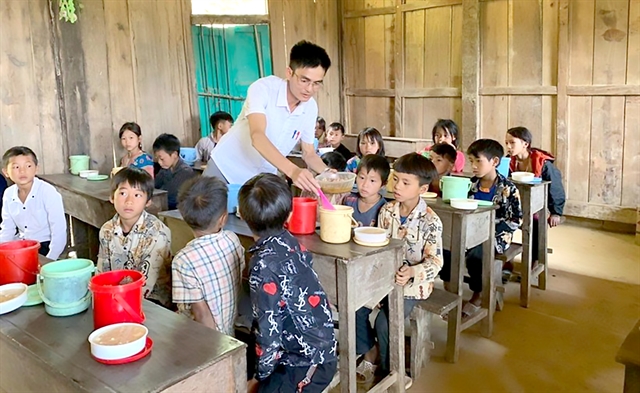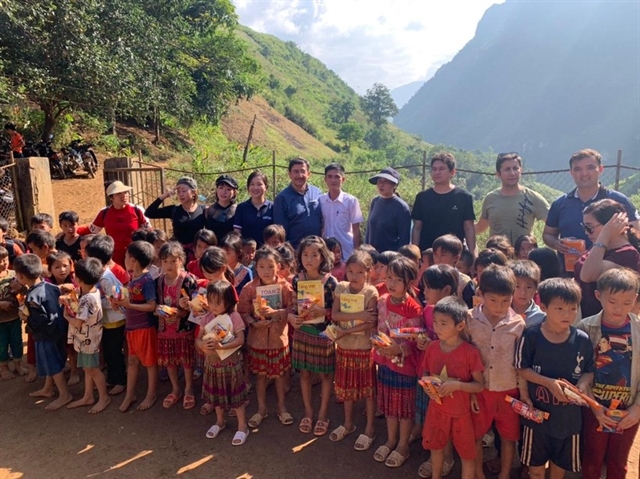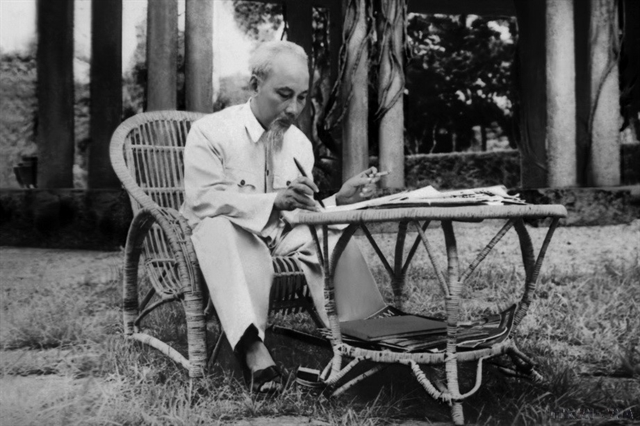 Society
Society


|
| Trần Nam San, principal of Tủa Sín Chải Boarding School, distributes food for students at lunchtime. — Photo giaoducthoidai.vn |
HÀ NỘI — Trần Nam San, principal of Tủa Sín Chải Boarding School for ethnic minorities, will never forget the bowls of rice a villager gave him when he had just arrived at the school in Lai Châu Province.
The woman always cooked rice for him and others, although they had only had cassava and potatoes as there was not much food. She wanted the teachers to be healthy and stay to teach the children.
"We were lucky as Chướng invited us to stay with her family. Chướng was a local woman, and her family was among the poor households in the commune," San said.
"They usually ate cassava and potatoes, but she always gave us rice – a pot of rice for the teachers – as she didn't want us to be hungry."
San and his colleagues said they felt touched by her family's affection and hospitality, so he did not return to his hometown in Vĩnh Phúc Province as planned.

|
| San (in white shirt) takes a group photo with students and donors at the primary school. — Photo giaoducthoidai.vn |
San grew up in Trung Kiên Commune, Yên Lạc District in northern Vĩnh Phúc Province. He started work as a teacher in 2003 and was assigned to move to Nậm Ban Primary School in Sìn Hồ District in Lai Châu the same year.
Lai Châu at that time was the most difficult province in the country, and Nậm Ban was among the poorest communes in Sìn Hồ District. Local people mainly worked on crops, and maize and rice were their main food.
Due to outdated production methods, they lived in hunger most of the time.
The day he prepared his backpack, he thought he would return to his hometown soon.
"I had so many worries and concerns. I decided to spend a few years in Lai Châu and then return to my hometown to start a new life," he said.
"But after several years living and working here, experiencing the way of life of local people and their shortcomings, especially disadvantages of the children, I forgot that intention."
San recalled the first day he and two colleagues arrived at the Chung Chải school site. The classroom was built with wooden poles. There was almost nothing inside, so the teachers had to stay in local people's houses until their house construction was completed.
Chướng's family warmly welcomed them to her house and always received them whenever they visited.
"Every time we visited her family, she cooked meals, invited us to stay, and kept food for us. Those are the memories I will never forget in my life," he said.
Five years later, San moved to Căn Co Primary School and then to Tủa Sín Chải Primary School in 2009. He has been appointed as principal of the school since 2013.
New mission
Tủa Sín Chải is the most disadvantaged commune in Sìn Hồ District. The commune is more than 40km from the district's centre, and there was no electricity, clean water, cell phone signal or roads.
The number of poor households was always top in the district.
There were 11 villages in the commune, scattered and separated by high mountains and deep valleys. The average distance between the villages was between 7-10km. The remotest village was more than 20km from the commune's centre.
"Our school has eight sites. Most teachers must stay in the village to get to the class on time. If we go to the commune's centre on weekends, we must come back on Sunday to go to class on Monday morning. We measure the road in hours of travelling instead of in kilometres," he said.

|
| The motorbike was pulled up with the help of local people after it went straight down a cliff. — Photo courtesy of San |
For San, travelling to school sites was challenging in the rainy seasons.
"I remember when we rode a motorbike to a school site in Phi Én Village. It rained heavily, and the red dirt road became slippery. One of my colleague's motorbikes went straight down the cliff. Fortunately, it got stuck between the reeds and forest vines," he said.
"It took us an hour to pull up the vehicle with local people's help. Thank God, the two teachers who fell were only slightly injured."
In Tủa Sín Chải Commune, most parents were not interested in their children's education. Children had to walk for hours to go to school, bringing their lunchboxes with only rice and salt. The number of children dropping out was high.
Lầu Hòa Bình, a resident of Háng Lìa Village, said: "Children in the 5th grade had to walk for more than two hours to get to the school site in the commune's centre. The younger walked for nearly an hour to their class."
To solve the problem, San volunteered to contribute part of his salary to buy food and cook meals for children at the school sites. He also asked village-based teachers to help cook for the children at lunch.
San also succeeded in mobilising individuals to contribute to buying food, warm clothes, shoes and even books for children in Háng Lìa, Phi Én, and Thành Chử villages.
"Free lunch for students has been implemented for four years. This is a meaningful activity as it significantly improves the quality of education, encouraging parents to send their children to school," he said.
Cháng A Bảy, a Phi Én school site student, said: "My teachers cook very delicious meals, and I don't have to bring my lunchbox to class like before."
After nearly 20 years of working for education in remote areas, he has been awarded a Certificate of Merit by the chairman of the Lai Châu Province's People's Committee. — VNS




